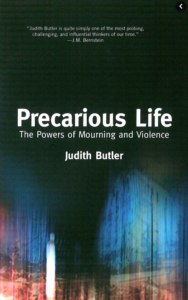In Precarious Life, Judith Butler proposes investigating the connection between political life and violence.[1] Introducing the concept of vulnerability, she attempts to comprehend social issues in a way that might reduce violence and, to do so, develops a position based on the recognition of vulnerability. Thus, she highlights the importance of grief.
The object of desire is formed by way of grief, and in its quality as lost, functions as a cause in phantasies. This, according to Lacan, comes to the place of the hole opened in the real by the loss of a loved one, and the dignity of the subject lies in the object a, cause of desire: the singularity of an irreplaceable cause.[2] Thus we only grieve for the person whose desire we’ve caused.
 That which makes us vulnerable―indicates Butler―is the first relation with the Other. Through the recognition of the vulnerability that dwells within ourselves, an “us” is formed. In private, we all suffer loss and the consequent grief. The problem arises in the public sphere: Which lives deserve public grieving, and which do not? Obituaries are acts of nation-building: in mass media, some deaths appear, and others are ignored. This shines a light on the media’s role in the construction of facts and suggests we question the relationship between the silencing of these deaths in discourse―that is, the discursive “disappearing” of certain deaths―and the violence that put an end to these lives.
That which makes us vulnerable―indicates Butler―is the first relation with the Other. Through the recognition of the vulnerability that dwells within ourselves, an “us” is formed. In private, we all suffer loss and the consequent grief. The problem arises in the public sphere: Which lives deserve public grieving, and which do not? Obituaries are acts of nation-building: in mass media, some deaths appear, and others are ignored. This shines a light on the media’s role in the construction of facts and suggests we question the relationship between the silencing of these deaths in discourse―that is, the discursive “disappearing” of certain deaths―and the violence that put an end to these lives.
Butler establishes the rights of man on the vulnerability that lives within us. Thinking of social bonds based on vulnerability supposes a form of identity politics that conserves differences of identity without homogenizing them. But the groups that form these identities, excluded from recognized representations, are the most vulnerable and ought to be safeguarded from harm. Such exclusion is usually based on traits such as race, gender and economic position. In this way, the new forms of fascism emerging in Brazil, the United States, Hungary and Germany reanimate the concept of a nation―according to Butler―in the name of ethnic purity and the pernicious rejection of the recognition of the equal rights of human beings. As a counterpoint, the presence of speaking bodies gathered in assembly through the occupation of spaces such as plazas, schools and buildings revendicates the status of these spaces as public at a time when this is precisely what is being threatened.[3] This highlights the importance of bodies and the way in which they are affected by discourse. The taking of those spaces implies a demand directed towards political power, though the mere presence of those bodies may not be sufficient, as Butler herself recognizes. Their discursive presence, one might add, is still lacking.
 Additionally, to understand how factions, particular identities and diverse interests can intertwine themselves without losing their individual nature, Butler defends the concept of populism shaped by Ernesto Laclau. This concept does not describe the fascist convergence on a “singular will” or the emergence of a charismatic leader that manages to unify the people (or appears to do so). And though naturally there is populism of both the left and the right, populism itself does not constitute a complete, well-defined political posture. So, in Butler’s opinion, Trump embodies a form of populism that leads to fascism by unleashing a deep-rooted hatred of differences (which are perceived as threatening) or that crosses over to violent action against those that threaten the interests of the nation in any part of the globe. (As we see, in an increasingly segregating age―politically as much as economically―the problem is the viability of democracy.)
Additionally, to understand how factions, particular identities and diverse interests can intertwine themselves without losing their individual nature, Butler defends the concept of populism shaped by Ernesto Laclau. This concept does not describe the fascist convergence on a “singular will” or the emergence of a charismatic leader that manages to unify the people (or appears to do so). And though naturally there is populism of both the left and the right, populism itself does not constitute a complete, well-defined political posture. So, in Butler’s opinion, Trump embodies a form of populism that leads to fascism by unleashing a deep-rooted hatred of differences (which are perceived as threatening) or that crosses over to violent action against those that threaten the interests of the nation in any part of the globe. (As we see, in an increasingly segregating age―politically as much as economically―the problem is the viability of democracy.)
Jean-Claude Milner introduces a different perspective than Butler’s. For him, rights are not sustained by vulnerability, but rather by the fact that we are speaking beings that have a body.[4] And Éric Laurent outlines how this perspective allows us to differentiate civil rights (that is, those rights that depend on nations, countries and history) from the rights of the parlêtre, which are absolute and unexpiring.[5]
In summary, we are presented with two contrasting ways of conceiving of social bonds. One of these ways takes as its point of departure this vulnerability that lives within the first bond we form with that Other that we depend on, inasmuch as such a dependency constitute us in precariousness. The recognition of our vulnerability creates an “us” that might be capable of treating violence. The second way of conceiving of this social bond doesn’t begin with that subject of the lack, but instead with the parlêtre, which has a body, and this fact allows us to think of symptom-as-bond and think of the other as partner-symptom.
In tune with this distinction, Jacques-Alain Miller notes that there are diverse forms of violence, since the violence that responds to a jouissance drive, for example, would never be mistaken for the violence that the S1 of the lalingua exercises over the body.[6] Likewise, not all violent action makes up a violent act strictly speaking: it can only do so if it produces a modification in the subject. “Where speech gives up, the domain of violence begins,” observes Lacan, “that violence reigns there already without us even provoking it.” There is violence, then, when the symbolic pact of words is broken and when the death drive surges, and only in that sense is it fair equate silence and violence.
As citizen analysts, it is up to us to fight the silencing of speaking beings, awaken ourselves and wake up from violent discourses.
[1] J. Butler, Precarious Life: The Power of Mourning and Violence, Nueva York, Verso, 2004.
[2] J. Lacan, The Seminar, Book VI, Desire and its Interpretation, Nueva York, Wiley, 2019, y The Seminar, Book VIII, Transference, Cambridge, Polity, 2017.
[3] J. Butler, Notes Toward a Performative Theory of Assembly, Cambridge, Harvard University Press, 2015.
[4] J.-C. Milner, Les penchants criminels de l’Europe démocratique, Lagrasse, Verdier, 2003.
[5] É. Laurent, “Discours et jouissances mauvaises”, in https://bit.ly/2QpWGjb.
[6] J.-A. Miller, “Violent Children”, in The Lacanian Review, 4 (2018).







